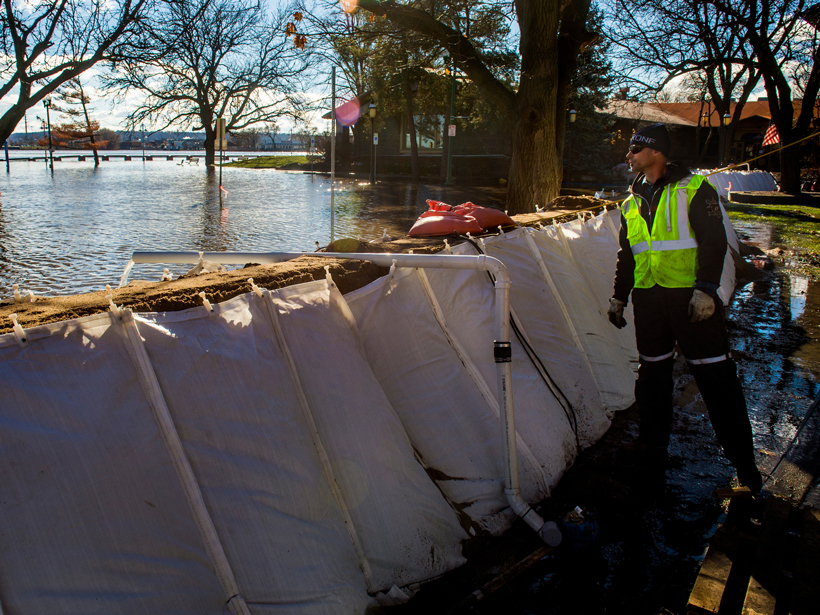With the Trump administration pushing for a $1 trillion investment in infrastructure, the new chairman of the House Transportation and Infrastructure Subcommittee on Water Resources and Environment wants to make sure that the administration’s forthcoming plan doesn’t just include money for roads, bridges, and airports. He says the plan also should fund water resources projects to improve navigation, flood protection, and other needs.
“Right now, the iron is hot, and we have to be active right now to help devise this transformational process for delivering water resource projects.”
“One of the most important investments we can make is water resource projects,” Rep. Garret Graves (R-La.) said Wednesday at the 2017 National Waterways Conference Legislative Summit in Washington, D. C. “I’m not just talking about levees, and deepening and dredging, and things along those lines. But I also think that includes some green infrastructure investments as well.”
Graves, who identifies himself as a conservative, said that the new administration provides an opportunity for improving the nation’s flood protection, navigation, and other infrastructure needs. “Right now, the iron is hot, and we have to be active right now to help devise this transformational process for delivering water resource projects,” he said.
Graves’s committee oversees water resources programs administered by the U.S. Army Corps of Engineers, Environmental Protection Agency, and other agencies. Before his election to Congress, Graves was chairman of Louisiana’s Coastal Protection and Restoration Authority while also serving as senior policy adviser to the governor on energy, environment, fisheries, and disasters.
He acknowledges that water projects aren’t the first thing that comes to mind when most people think about infrastructure. However, Graves said that he and others started to engage with President Donald Trump early on, informing the campaign about the importance of water resources infrastructure.
Infrastructure on the Agenda
Trump, in his 28 February address to Congress, said, “To launch our national rebuilding, I will be asking the Congress to approve legislation that produces a $1 trillion investment in the infrastructure of the United States—financed through both public and private capital—creating millions of new jobs.” He also discussed infrastructure at a Wednesday meeting with Vice President Mike Pence and some cabinet secretaries and stakeholders.
Earlier, Trump signed a 24 January executive order to expedite environmental reviews and approvals for high-priority infrastructure projects. Also on 24 January, a group of Democratic senators and independent Sen. Bernie Sanders released a $1 trillion infrastructure plan that would include $110 billion for water and sewer investments.
Finding $1 Trillion
“Think just for a minute about the challenge that we are going to experience trying to squeeze $1 trillion out of anything to try and deliver an infrastructure package.”
Despite calls from the White House and Democrats for a big infrastructure package, Graves said finding the money would be difficult. He said that nondefense federal agencies are already going through budgetary pains as the administration tries to find $54 billion to increase defense funding.
“Think just for a minute about the challenge that we are going to experience trying to squeeze $1 trillion out of anything to try and deliver an infrastructure package,” he said. Graves added that the administration and Congress would look at innovative approaches, including revising the tax code, to incentivize private sector investments.
An Ounce of Prevention
Graves said that the default position of many conservatives is that any federal spending is bad because it increases the deficit. However, he said that sentiment could “flip” by developing improved project prioritization criteria to demonstrate that good investments actually yield cost savings and increased economic activity.
“Somehow, we have regressed in the nation to a situation where we prefer to spend billions of dollars after a disaster rather than millions of dollars before,” he said.
Graves pointed to economic benefits from water projects, including navigation projects that facilitate maritime commerce; flood protection projects that help to provide a stable economic climate for businesses; and ecosystem restoration projects that help to ensure environmental productivity, whether for fish and wildlife or for clean water.
The Regulatory Environment
Some environmentalists and others worry that changes and reductions in regulations could lead to less stringent environmental protections, among other concerns. In a 30 January executive order, the White House requires identifying two regulations to repeal for each new regulation.
Graves said that “if we are going to deliver $1 trillion in infrastructure projects, we need to make sure that we have a regulatory process that is efficient” so that projects get approved and concluded more quickly.
He said that it was “fascinating” that projects to improve environmental productivity or provide environmental restoration sometimes stay in the development stage for years to complete a National Environmental Policy Act (NEPA) analysis or meet other regulatory requirements. “The entire notion of having to spend 5 years to do a NEPA analysis on a project that’s actually going to result in better environmental productivity baffles me,” he said.
—Randy Showstack (@RandyShowstack), Staff Writer
Citation:
Showstack, R. (2017), Key house member makes a conservative’s case for water projects, Eos, 98, https://doi.org/10.1029/2017EO069701. Published on 13 March 2017.
Text © 2017. The authors. CC BY-NC-ND 3.0
Except where otherwise noted, images are subject to copyright. Any reuse without express permission from the copyright owner is prohibited.

